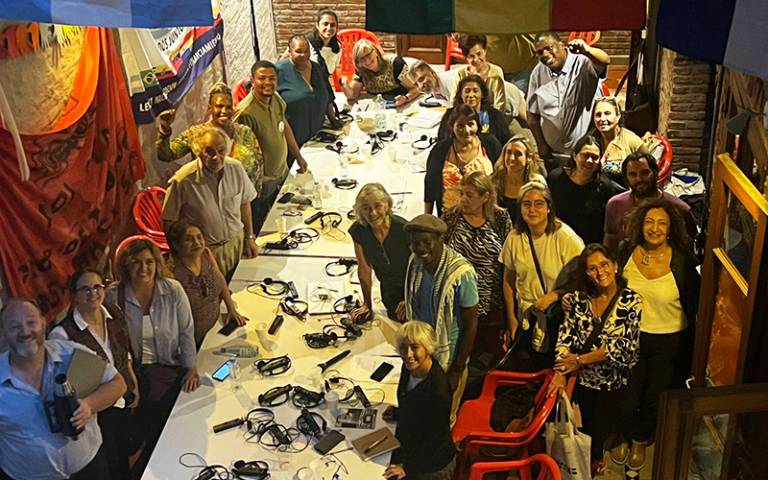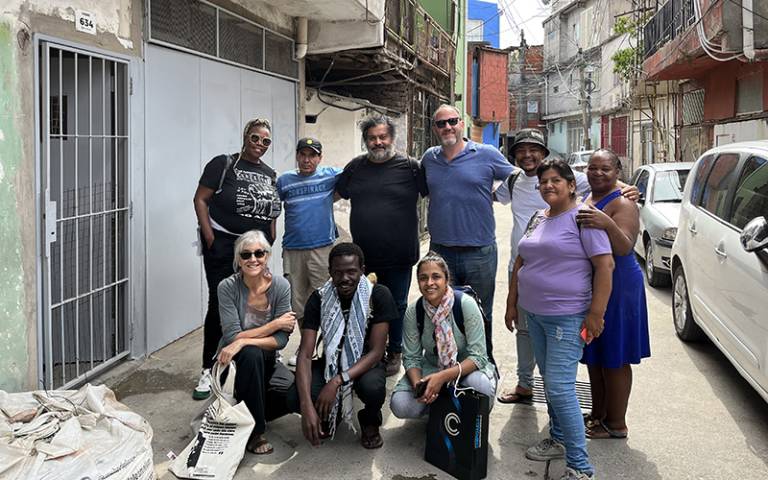Seeking convergence across social and feminist movements, geographies and habitat-related struggles
19 April 2023
As President of Habitat International Coalition (HIC), DPU’s Adriana Allen participated in the 3rd World Forum on Human Rights and spearheaded a cross-regional gathering of social and feminist movements working to advance the right to the city.

Between March 19th to 24th, 2023, Habitat International Coalition (HIC) convened a meeting in Argentina with representatives from over 20 social and feminist movements, and support organizations from Argentina, Brazil, India, Mali, South Africa, Uruguay, and Zimbabwe to explore and strengthen their convergence across different struggles, regions, and generations.
A collective roadmap to strengthen linkages, dialogue, and advocacy among common struggles
The objective of the meeting was to initiate the collective construction of a common agenda and roadmap for action, learning and advocacy from the social, feminist and workers movements that work within or in alliance with HIC. The meeting also aimed to discuss the principles, processes, practices, and trajectories that are enabling social movements to incorporate a feminist perspective and political leadership within them. The experience marks a milestone in the history of HIC and opens a route of collective work to consolidate and expand through the active participation of more movements from different regions.
Local experiences and popular processes in the social production of habitat
In addition to the convergence meeting held at the headquarters of the Movement of Squatters and Tenants (MOI), participants engaged with different experiences in the social production of habitat on the ground. These included several visits in the metropolitan area of Buenos Aires, co-organized by Madre Tierra, Habitar Argentina and Federación Tierra y Vivienda, to learn how settlements born out of land occupations are undergoing processes of consolidation thanks to the Fair Access to Habitat Law of the Province of Buenos Aires (Law 14449). In addition, further visits were made to housing cooperatives in the city of Buenos Aires, whose work was possible in the framework of the 2000 Law 341 of Buenos Aires City. Promoted by social movements and allies, this law establishes the legitimacy of cooperatives as recipients of state funds and state land for housing redevelopment and construction, and self-management as a mode of housing provision.

The week also provided the opportunity to engage with Urbana TeVe, the first popular communication project in the history of Argentinean TV that broadcasts and has its studios in an area commonly designated as a ‘slum’, ‘Villa 31’ in the heart of Buenos Aires business district.
Participation in the 3rd World Forum on Human Rights provided an opportunity to further debate on the scope and transformative power of a new generation of laws pushing for State engagement in the social production of habitat in Argentina, Brazil and Venezuela.
Adriana highlights that “social, feminist and workers movements are the compass and motion of any collective project towards the realisation of habitat-related human rights.” And elaborates on three key agreements reached throughout the convergence gathering:
- To promote and practice international solidarity, particularly towards movements that are working in contexts of repression and political persecution.
- To activate a collective interregional space for political reflection based on counter-hegemonic, anti-patriarchal and anti-racist principles to support and consolidate social mobilization, action, and advocacy at the inter-regional and international level.
- To build collectively a militant and multilingual lexicon based on the key concepts that synthesize social, feminists and workers movements struggles in defence of habitat-related human rights, including terms such as ‘social production of habitat’, ‘autogestion’ and ‘cooperativism’, among many others, to overcome the colonialism of language.
The week culminated with a massive march in the city of Buenos Aires to celebrate the Day of Memory for Truth and Justice in Argentina, a sobering reminder that democracy and rights are defended and advanced in the streets and on the basis of collective mobilization, resisting silence, apathy and oblivion.
 Close
Close

